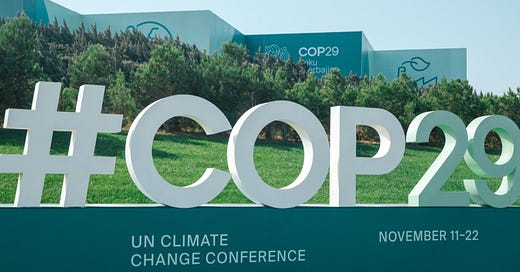COP29: Leadership and the Future of Climate Policy
Progress or Political Posturing?
Carbon Credits: A Supplement, Not a Panacea
The 29th United Nations Climate Change Conference (COP29) has opened in Baku, Azerbaijan bringing together representatives from nearly 200 countries. The beginning of the summit was highlighted by an agreement. Following almost eight years of negotiations, the countries agreed to put into action Article 6 of the Paris Agreement, establishing a multibillion-dollar carbon market overseen by the UN. This market will enable countries and companies to trade carbon credits as part of their strategies to meet their emissions targets.
Carbon credit systems have been around for a while. The Clean Development Mechanism (CDM) was among the first market-based mechanisms to promote emissions reductions. Adopted in 1997, during the Kyoto Protocol, and implemented in 2005, the CDM allowed developed countries to invest in emission-reduction projects in developing countries and in exchange they received Certified Emission Reductions (CERs), with each CER equating to a reduction of one metric ton of carbon dioxide (CO2) equivalent. While groundbreaking at the time, the CDM faced criticism for enabling some participants to claim carbon offsets without genuine reductions in overall emissions. The Volkswagen Emissions Scandal is one such example. Similarly, large retail companies like Amazon, have pledged to achieve net-zero emissions by purchasing carbon credits to offset emissions from their vast supply chains, yet they have made little effort to address the core issue of high emissions from packaging, transportation and logistics.
Article 6 expands on the CDM's legacy by including commitments from both developed and developing countries to achieve their emissions goals. It enables cooperative approaches between countries in a more flexible and cost-effective way and introduces a globally standardised process under UN oversight to restore trust and ensure consistency and independent verification to prevent abuses and inflated claims of sustainability.
While Article 6 represents a leap forward, carbon credits seen as a supplement rather than the cornerstone of climate policy. The ultimate goal must be a drastic reduction in the use of fossil fuels, coupled with changes in energy production and consumption. In fact, what we see is that emissions continue to increase. We’re going to miss the 1.5oC by a very long way.
Another key focus at COP29 is increasing financial support for developing countries to adapt to climate impacts. Although approximately $1.5 trillion has been spent globally on climate action since 2022, only a small fraction—not even 3%—has reached the world's least developed nations. This gap underscores the urgency of establishing a new climate finance target to replace the $100 billion commitment that is now expiring. The UN's recent report indicates that $584 billion is needed from 98 countries to adequately support transitions to clean energy and resilience against climate change.
Political Influence: The U.S. Election and Global Reactions
There is no doubt that the outcome of the U.S. presidential election on November 5, 2024, has significantly influenced the dynamics of COP29 by creating a sense of urgency in the negotiations. With the election of a president who famously called climate change 'a big hoax,' the U.S. is unlikely to increase financial aid to developing countries for climate initiatives. The appointment of pro-oil figures to influential positions, such as Lee Zeldin—an enthusiastic supporter of the president-elect's rallying mantra, “Drill, baby, drill”—to the Environmental Protection Agency (EPA), also signals a clear intention to pivot away from stringent environmental policies toward an era that prioritises industry interests over ecological and climate concerns. It’s not a surprise then, that following the election, the fossil fuel and mining industries are optimistic that the president-elect will fulfil his pledges to reverse regulations established by the Biden administration. In the meantime, 2024 is expected to be the warmest year on record.
Who Will Lead as the U.S. Steps Back
This policy shift raises questions about whether other key players, such as India and China, the other two bid emitters, will step up to fill the potential leadership void. Their absence from Baku is indicative. Absent are also Macron, Shultz, and the President of the European Union, Ursula von der Leyen. Even Lula, the President of Brazil, who will host COP30 in 2025, is absent. Nevertheless, the U.K. Prime Minister's Kier Starmer presence and pledge to reduce emissions by 81% from 1990 levels by 2035 demonstrate that some countries remain committed to ambitious climate action, even amid geopolitical shifts. The downside of these very big ambitions, as we've seen time and again, is that they fail to be met.
Last minute news: COP29 Exit
Argentine negotiators representing the administration of Javier Milei—yes, the far-right leader who famously dismissed the climate crisis as a “socialist lie"—have been instructed to withdraw from COP29 and will no longer attend the Baku climate summit.
I’m only surprised he hasn’t pulled out of the Paris Agreement yet. Perhaps he's been waiting for the U.S. elections to set the stage. It takes a certain audacity to make such a big move solo.
References:
Additionality in the Clean Development Mechanism: Why and What?" The Oxford Institute for Energy Studies
What Could the New Climate Finance Goal Look Like? 7 Elements Under Negotiation, World Resources Institute
Climate talks open with calls for a path away from the 'road to ruin.' But the real focus is money, Associated Press
Trump energy allies anticipate boom times for oil, gas, mining, The Hill
Environmental Integrity under Article 6 of the Paris Agreement, German Emissions Trading Authority (DEHSt)
Are carbon offsets all they’re cracked up to be? We tracked one from Kenya to England to find out. Vox
Why Carbon Offsets May Not Be as Green as You Think" (National Geographic)
Starmer: New UK target for 81% emissions cut by 2035, BBC
COP29: World leaders meet in Baku, with big names missing, DW




